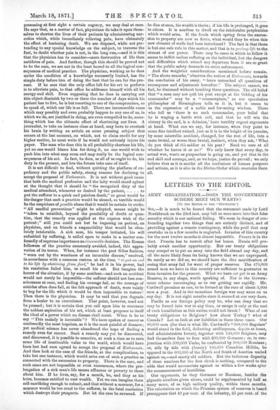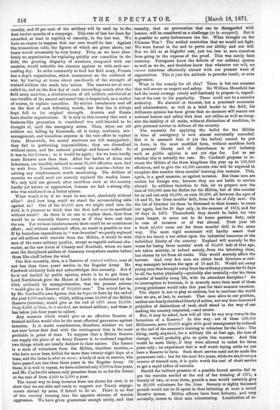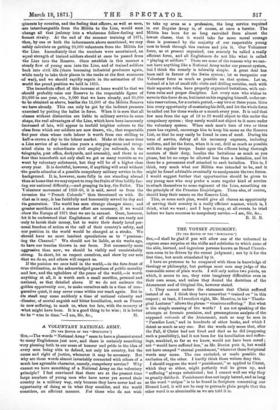LETTERS TO THE EDITOR.
ARMY ORGANIZATION.—DOES THE GOVERNMENT SCHEME MEET OUR WANTS?
[TO THE EDITOR. OF THE SPEOTATOS:1
SIR,-It is much to be feared that the statement made by Lord Northbrook on the 23rd inst. may lull us once more into that false security which is our national failing. We seem in danger of con- founding together two things that are entirely distinct, and of providing against a remote contingency, while the peril that may overtake us in a few mouths is neglected. Invasion of this country for the next twelve months is almost impossible. France is in the dust. Prussia has to recruit after her losses. Russia will pro- bably await another opportunity. But our treaty obligations may compel us to put an army into the field abroad any day, and all the more likely from its being known that we are unprepared. So surely as we did so, we should have the dire mortification of seeing that army fail for want of proper reserves. The 470,00a armed men we have in this country are sufficient to guarantee us from invasion for the present. What we have not got is an Army Reserve, in any shape, worth speaking of. Nor is the Govern- ment scheme encouraging as to our getting one rapidly. Mr. Cardwell promises us one, to be formed at the rate of about 5,000 men a year. And in the meantime foreign war may some on us any day. It is not eight mouths since it seemed at our very doors.
Pacific as our foreign policy may be, who can deny that we may be forced into war at any time, or escape it only at the cost of such humiliation as this nation could not brook ? What of our treaty obligations to Belgium? how about Turkey ? what of Canada? Let us look at our liabilities in these three cases. Our 80,000 men (for that is what Mr. Cardwell's "108,000 Regulars" would stand in the field, deducting artillerymen, depots at home, and administrative forces), together with 150,000 Belgians, may find themselves face to face with 600,000 Germans ; or, in con- junction with 300,000 Turks, be confronted by 900,000 Russians ; or, side by side with (barely) 100,000 Canadian Militia, be opposed to the 600,000 of the North and South of America united against us,—and mostly old soldiers. But the ludicrous disparity of these numbers for the first shock is nothing, compared to the odds that would accumulate against us within a few weeks after the commencement of hostilities.
Our opponents, be they Germans or Russians, besides the gigantic numbers given above, could be supplemented by half as many- more, of as high military quality, within three months. The calculation on which the Prussian system of reserves is based presupposes that 40 per cent, of the infantry, 25 per cent, of the
cavalry, and 20 per cent. of the artillery will be used up in the first twelve months of a campaign. This rate of loss has been far exceeded, at least in rapidity of casualty, in the late war. We have no reason to suppose that our own would be less. Against the tremendous odds, the figures of which are given above, our losses would necessarily be very heavy. Thus, as we have abso- lutely no organization for replacing quickly our casualties in the field, the growing disparity of numbers, compared with our enemies, would redouble the chances against us with each suc- ceeding day. In order constantly to feed her field army, Prussia has a depOt organization, which commences on the outbreak of war, by leaving at home about one-fourth of the strength of trained soldiers she sends into action. The reserves are at once called in, and on the first day of each succeeding month after the field army marches, a reinforcement of old soldiers, calculated at one-twelfth of the annual estimated loss, is despatched, as a matter of course, to replace casualties. By similar instalments sent off on the first of each following month, her first line is always kept full to its original strength. Austria and Russia have similar organizations. It is only in this country that such a business-like precaution is considered too cold-blooded to be thought of, until the emergency arises. Then, when our old soldiers are falling by thousands, all is hurry, confusion, mis- management, and boundless expense in the vain effort to replace them. Meanwhile, the scanty survivors are left unsupported ; they fail in performing impossibilities ; they are discredited without cause, and the national prestige and honour suffer. So it was in the Crimea ; so it would be again ; for we have hardly more Reserve now than then. After the battles of Alma and Inkerman, our handful, reduced to some 23,000 effective men, had to wait from November, 1854—nearly six months—before re- ceiving any reinforcement worth mentioning. The driblets of recruits we could send out scarcely replaced the weekly losses. We only held our ground, after sacrifices such as the country hardly yet knows or appreciates, because we had a strong ally, who was reinforced on a better system.
What would it be if we went to war now, absolutely without allies ? And how long could we stand the accumulating odds against us ? Out of the 80,000 men we might send into the
field, is it pleasant to think that the first half must be sacrificed without result? As there is no one to replace them, their lives
would be as wantonly thrown away as if they were cast into the sea. For without reinforcements there could be no continuous effort ; and without continued effort, no result is possible in war.
if by boundless expenditure in "war-bounties" we partly replaced our old soldiers with recruits from the Militia, it would be with men of the same military quality, except as regards national cha- racter, as the raw levies of Chanzy and Bourbaki, whom we have seen the disciplined soldiers of Germany everywhere scatter before them like chaff before the wind.
Our first necessity, then, is a Reserve of trained soldiers, men of not less than three years' service in the Regular Army. Mr.
Cardwell evidently feels and acknowledges this necessity. But if he is not backed by public opinion, where is he to get them ? Lord Northbrook gave the House of Lords to understand on the 23rd, evidently by misapprehension, that the present scheme "would give us a Reserve of 100,000 men." The actual fact is,
by Mr. Cardwell's own figures, that he hopes to have by the end of the year 9,000 such men ; which, adding some 15,000 of the Militia Reserve (recruits), would give at the end of 1871 some 24,000. Only 9,000 of these, be it marked, are trained soldiers ; and these it has taken just four years to collect.
Any measure which would give us an effective Reserve of trained soldiers would also be the most effectual guarantee against invasion. It is worth consideration, therefore, whether we had not now better first deal with the contingency that is the most probable in point of time. To suppose that a Militia Reserve can supply the place of an Army Reserve is to confound together
two things which are totally distinct in their nature. The former is a mass of volunteers from the Militia, therefore recruits,—
who have never been drilled for more than twenty-eight days at a
time, and the latter is what we want ; a body of men in reserve, who have passed not less than three years in the Regular Army. Of
these, it is well to repeat, we have collected only 9,000 in four years, and Mr. Cardwell's scheme only promises them to us for the future at the rate of from 4,000 to 5,000 a year.
The surest way to keep invasion from our shores for ever, is to show that we are able and ready to support our Treaty engage- ments abroad by arms, if forced to do so. There is no fear of this country running into the opposite extreme of wanton aggression. We have given guarantees enough surely, and that
recently, that no provocation that can be disregarded with honour, will be considered as a challenge (to be accepted). But it
is possible to carry forbearance too far. What brought on the Crimean War ? The settled conviction that we would not fight. We were forced in the end to prove our ability and our will.
But we did so at frightful cost, just too late to save ourselves from going to the expense of the proof. This was surely false economy. Foreigners know the defects of our military system
as well as we do, and therefore know that whatever our will, we cannot intervene effectually abroad with our present want of organization. This is just the attitude to provoke insult, or even aggression.
What is the remedy for all this? There is but one measure that will secure us respect and safety. Sir William Mansfield has bad the moral courage calmly and fearlessly to propose it, regard- less of the cost to his popularity. There could not be a sounder authority. No alarmist or theorist, but a practised economist
and administrator, as well as a tried leader in the field, his deliberate opinion has been given that no measure will ensure our
national honour and safety that does not utilize as well as recog- nize the liability of all ranks, without distinction of condition, to give personal service in defence of the country.
The necessity for applying the ballot for the Militia in time of emergency is now almost universally conceded. But it is assumed that it (or the ballot) cannot be put in force, in the most modified form, without sacrifices both of personal liberty and of disturbance to civil industry such as public opinion is not yet ripe for. Let us see whether this is actually the case. Mr. Cardwell proposes to in- crease the Militia of the three kingdoms this year up to 139,000 effectives, and to give the 45,000 recruits who will be required to complete this number three months' training this summer. This, again, is a good measure, as against invasion. But these men are useless for foreign war, because they are not liable to service abroad. In addition therefore to this, let us prepare now the lists of 100,000 men for Ballot for the Militia, but of this number let us call out only 40,000, or even 30,000, all between the ages of 18 and 21, for three months' drill, from the 1st of July next. On the 1st of October let them be dismissed to their homes ; to come out again, but for 28 days only, in the summer of 1872, and for 28 days in 1873. Thenceforth they should be liable for two years longer, to come out to do home garrison duty, only in case of invasion or of war abroad. Next year let a fresh 40,000 come out for three months' drill in the same way. The most rigid economist will hardly assert that this is too heavy a tax either upon the industrial resources or the individual liberty of the country. England will scarcely be the worse for losing three months' work of 40,000 lads of that age, not taken entirely, or indeed mainly, from the labouring class, but chosen by lot from all ranks. This would scarcely affect the harvest. And very few men are either bank directors or rail- way managers between the ages of 18 and 21. Would not every young man thus brought away from his ordinary pursuits for 84 days be all the better physically—probably also mentally—for his three months' of healthy camp life, with its attendant discipline ? As to interruption to business, it is scarcely more than most of these young gentlemen would take this year for their summer vacation.
The object is not to play at soldiers, but to convince the world that we are, at last, in earnest. That once alive to our position, neither our dearly cherished liberty of action, nor any time-honoured prejudice of distinctions of rank, shall stand in the way of our making the country respected,—and secure.
But, it may be asked, how will all this be any step towaris the formation of a Reserve ? In this way : out of those 139,000 Militiamen, some 20,000 might with good management be induced at the end of the summer's training to volunteer for the Lin?. The liking, easily acquired, for a military life at that age, the love of change, would probably give us quite this number. And this would be more likely, if they were allowed to enlist for three years only ; an experiment that is well worth trying while we yet have a Reserve to form. Such short service need not be made the permanent rule ; but for the next five years, while we are forming a reserve of trained men, it is quite worth the cost of short service to get a rapid influx of recruits.
Should the indirect pressure of a possible forced service fail to get the recruits needed at the end of the training of 1871, a bounty of two, or even three, pounds a man would certainly give us 20,000 volunteers for the Line. Seventy or eighty thousand pounds would not be ill-spent in thus initiating at once a sound Reserve system. Militia officers have been hitherto, and very naturally, averse to their men volunteering. Localization of re-
:giments by counties, and the feeling that officers, as well as men, are interchangeable from the Militia to the Line, would soon -change all that jealousy into a wholesome fellow-feeling and 'honest rivalry. At the end of the summer training of 1871, 'then, by one or both the inducements above mentioned, we may safely calculate on getting 20,000 volunteers from the Militia for the Line. Immediately that the numbers were ascertained, an equal strength of trained soldiers should at once be passed from the Line into the Reserve. Once establish in this manner a steady flow of young men into the Line, and of trained soldiers back into civil life (there becoming industrial producers again, while ready to take their places in the ranks at the first summons -of war), and we should rapidly regain in the estimation of the world the proud position we held in 1815.
The immediate effect of this increase at home would be that we -should probably raise our Reserve to the respectable figure of 30,000 in one year, viz., 9,000 that we have already, and 20,000 to be obtained as above, besides the 15,000 of the Militia Reserve ‘Ave have already. This can only be got by the indirect pressure exercised by putting the ballot in force. When it is seen that all -classes without distinction are liable to military service in some shape, the real advantages of the Line, which have been immensely Increased of late, will appear in tenfold brighter colours to the -class from which our soldiers are now drawn, viz., that respectable 'but poor class whose rude labour is worth from one shilling to half-a-crown a day in the labour market. Make at the same time -a Line service of at least nine years a stepping-stone and recog- mized claim to subordinate civil employ (on railroads, in the telegraphs, post office, dockyards, and arsenals), and there is no leer that henceforth not only shall we get as many recruits as we want by voluntary enlistment, but they will be of a higher class • every year. It is doubtful, however, if anything will avail without 'the gentle stimulus of a possible compulsory military service in the background. It is, however, more fully in our standing abroad -than at home that we may expect to reap the fruits of thus boldly fac- ring our national difficulty,—and grasping its key, the Ballot. The Volunteer movement of 1859-60, it is said, saved us from the invasion the "French Colonels" then threatened us with. Be that as it may, it has faithfully and honourably served its day and its generation. The world has seen strange changes since ; and greater sacrifices and a sterner effort are necessary, if we would -show the Europe of 1871 that we are in earnest. Once, however, let it be understood that Englishmen of all classes are ready not -only to lavish their money, but to waive their dearly loved per- sonal freedom of action at the call of their country's safety, and -our position in the world would be changed at a stroke. We should have no more insolent speculations as to "pontoon- lug the Channel." We should not be liable, as six weeks ago, to have our treaties thrown in our faces. Not necessarily more -aggressive than now, we should be visibly and unmistakably :strong. In short, let us respect ourselves, and show by our acts 'that we do so, and others will respect us.
If the position we once held in the world,—in the fore-front of true civilization, as the acknowledged guardians of public morality -and law, and the upholders of the peace of the world,—is worth anything at all, it is worth such a small sacrifice, personal and .national, as that detailed above, if we do not embrace the .golden opportunity now, to make ourselves safe in a time of com- parative quiet, it may never come within our reach again. But in fits stead may come suddenly a time of national calamity and .disaster, of mortal anguish and bitter humiliation, such as France 'is now suffering, to mock us, when too late, with the memory of what might have been. It is a good thing to be wise ; it is better 'to be "wise in time."—I am, Sir, ikc., H.




































 Previous page
Previous page